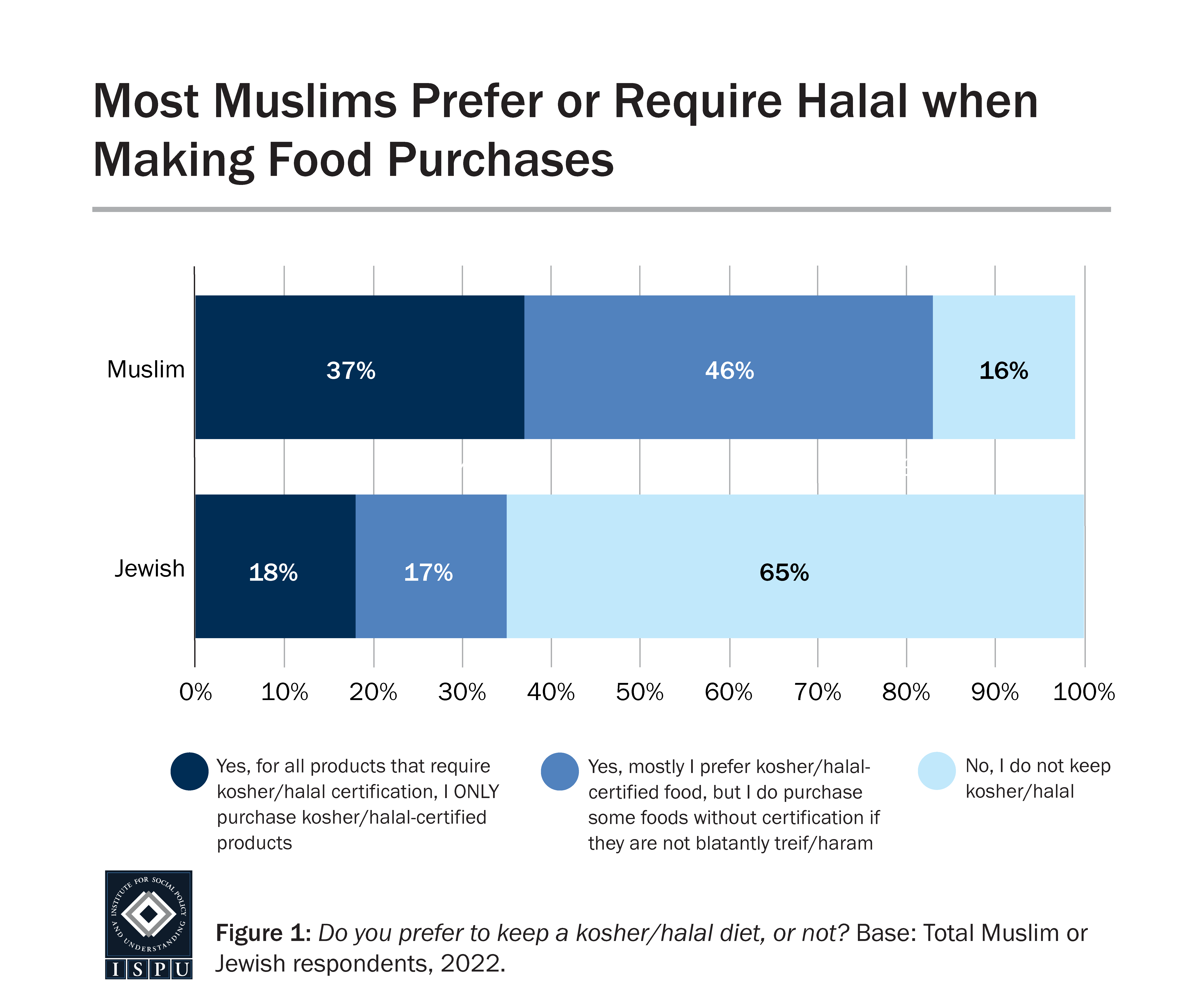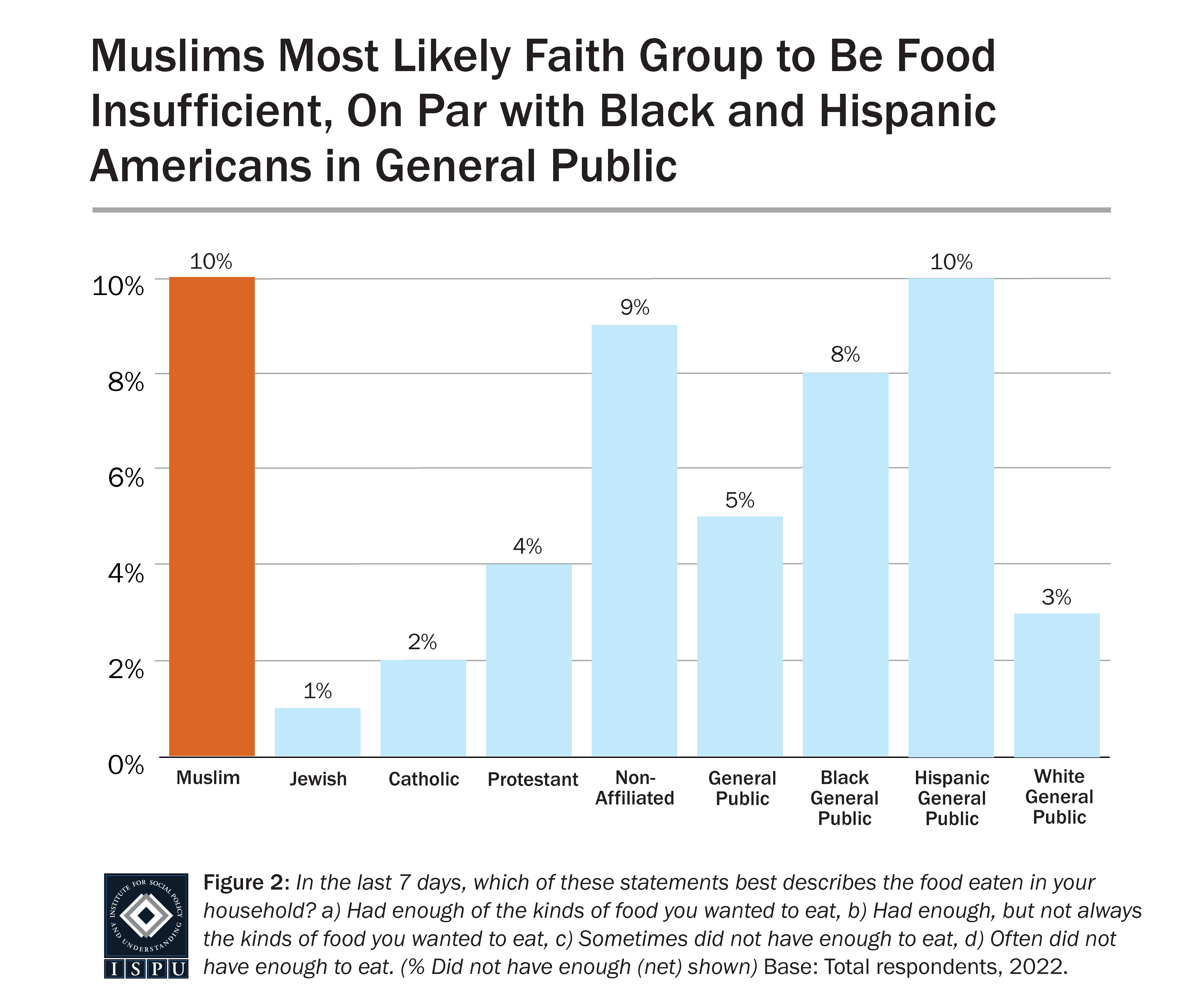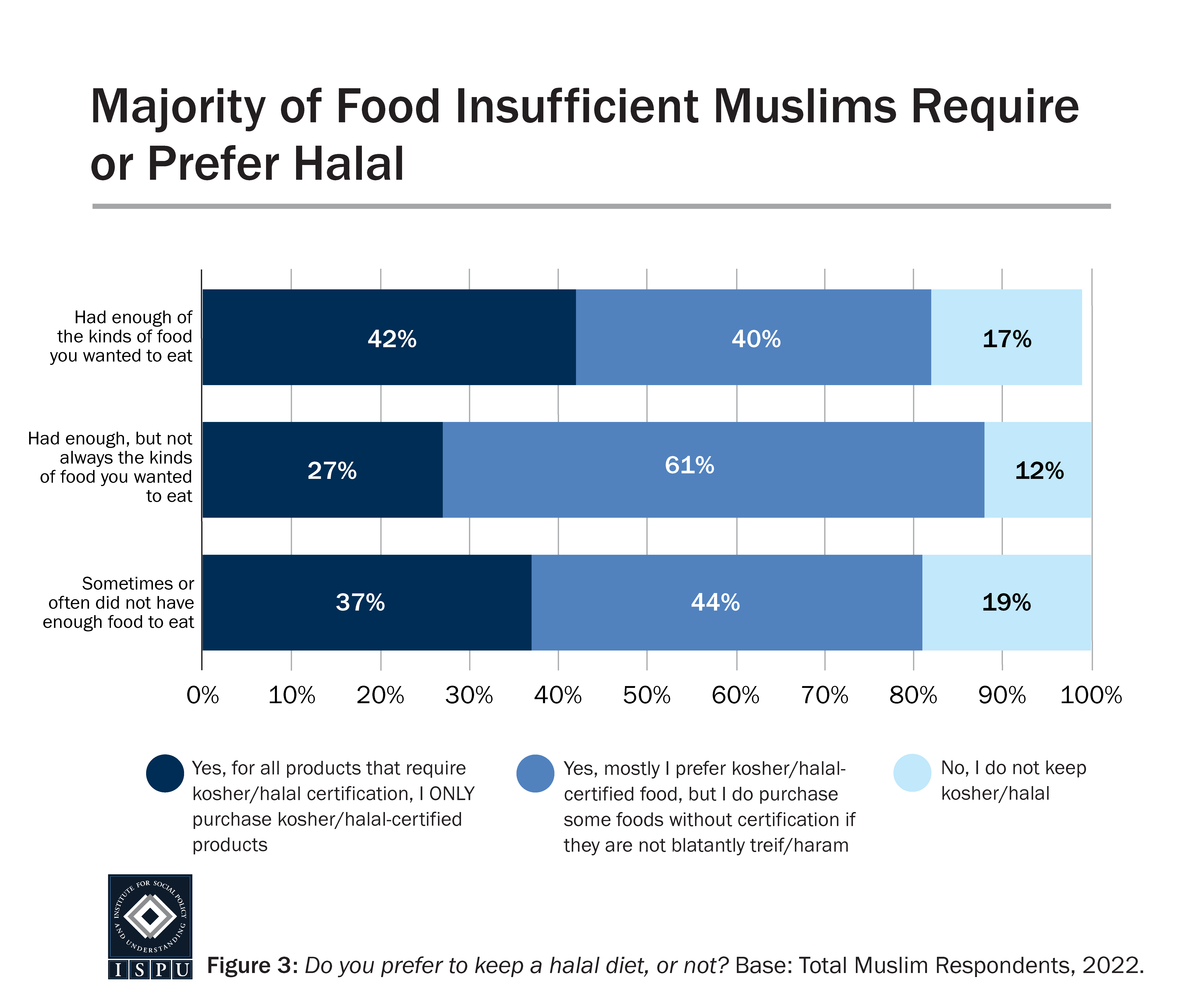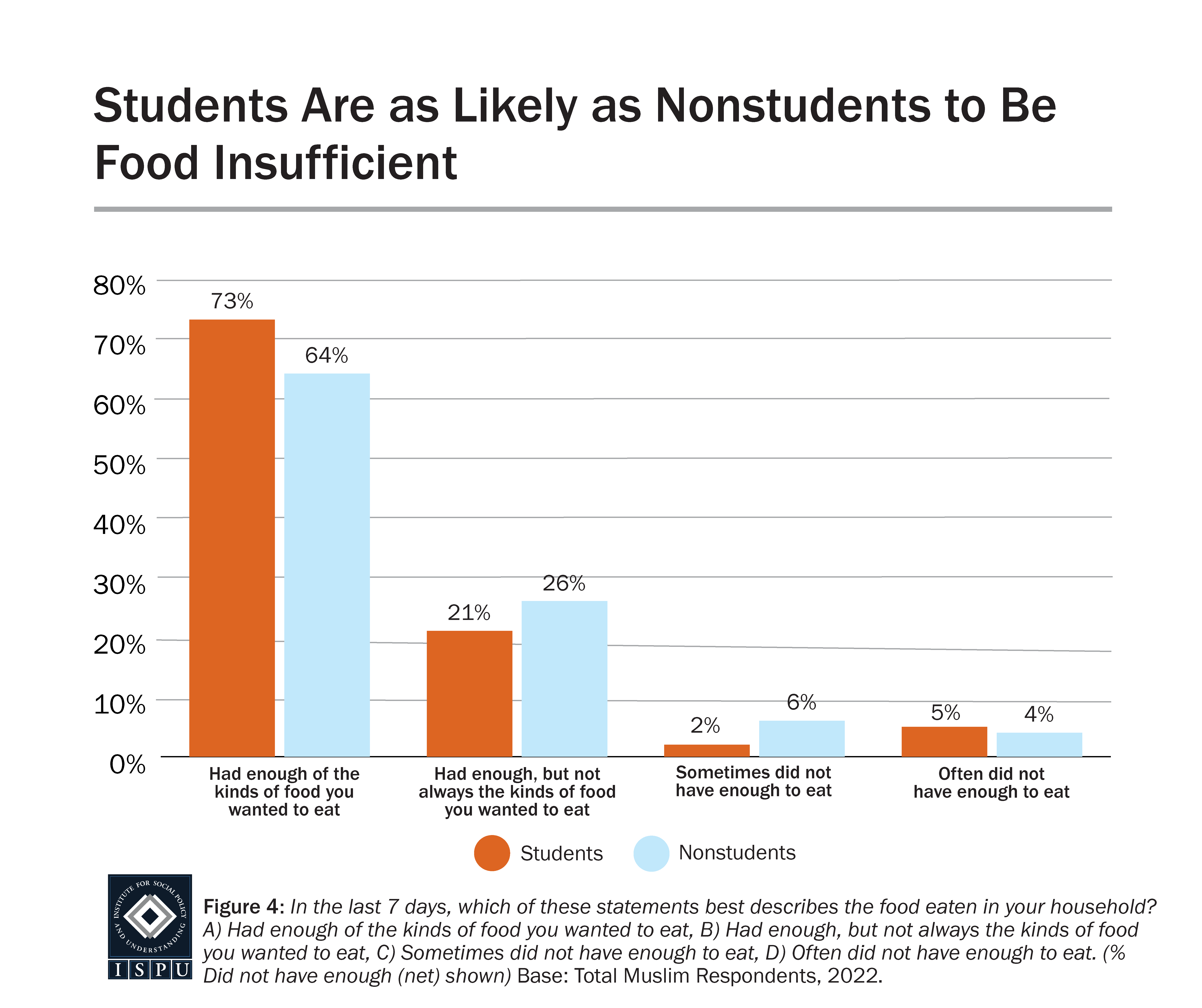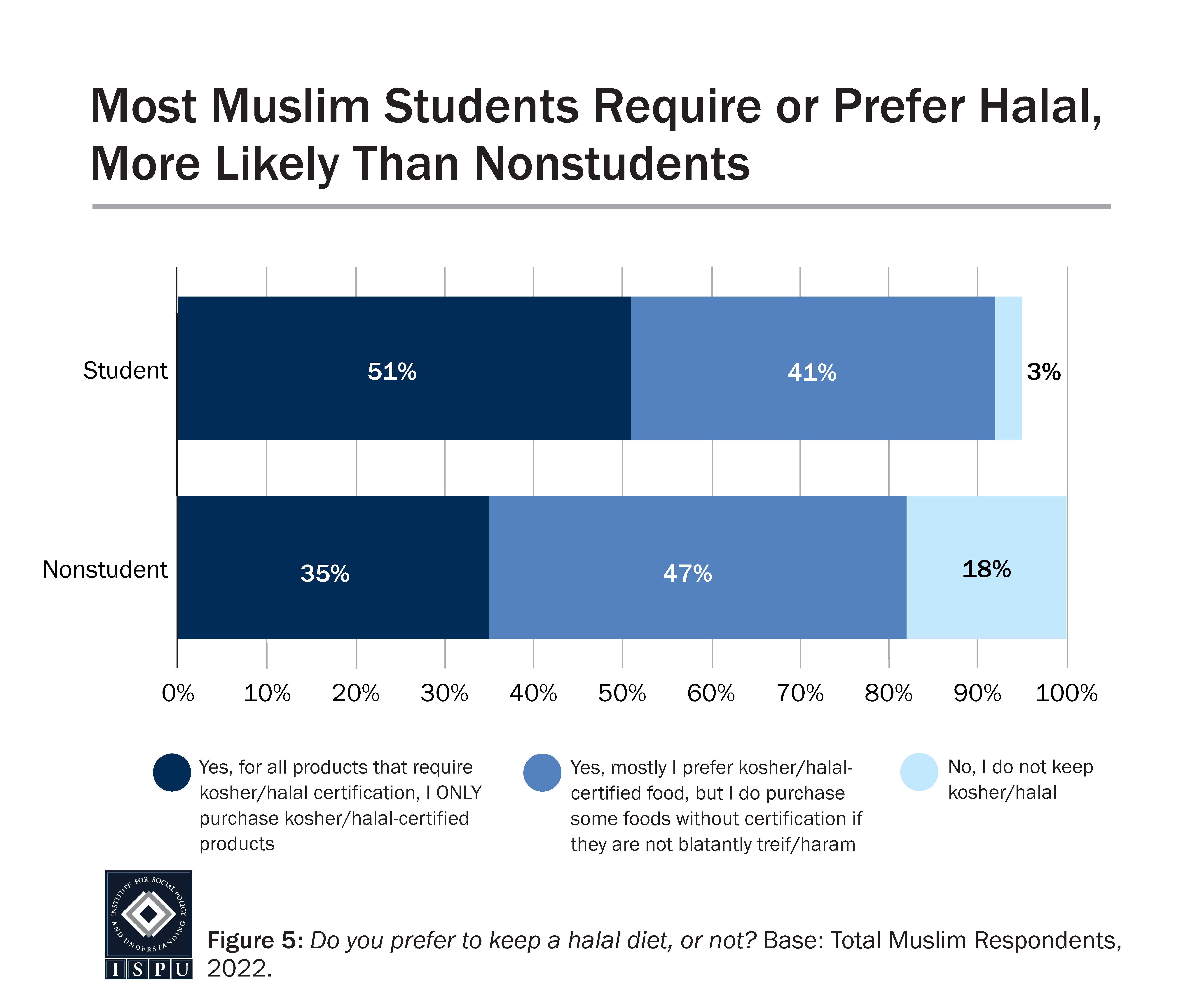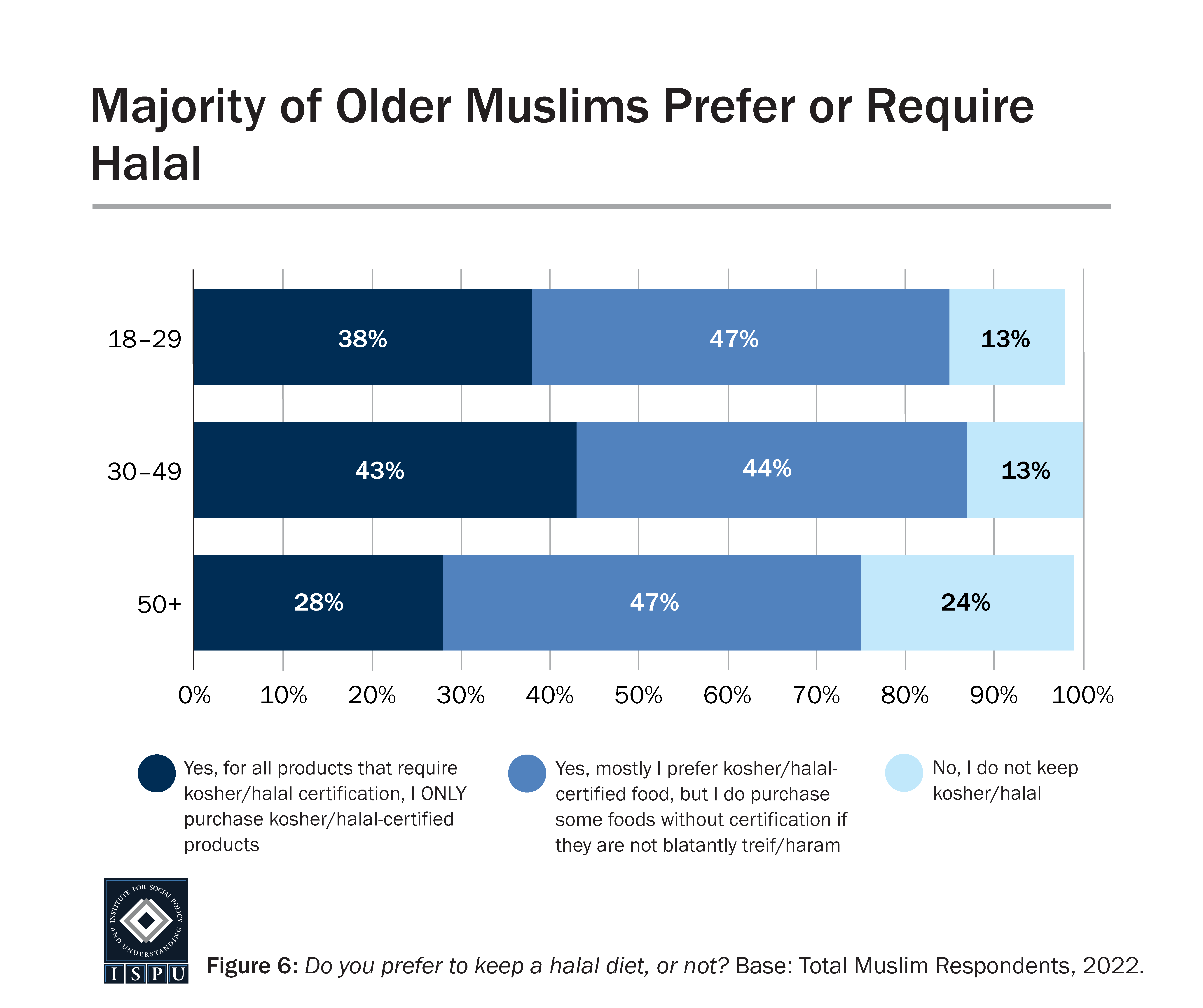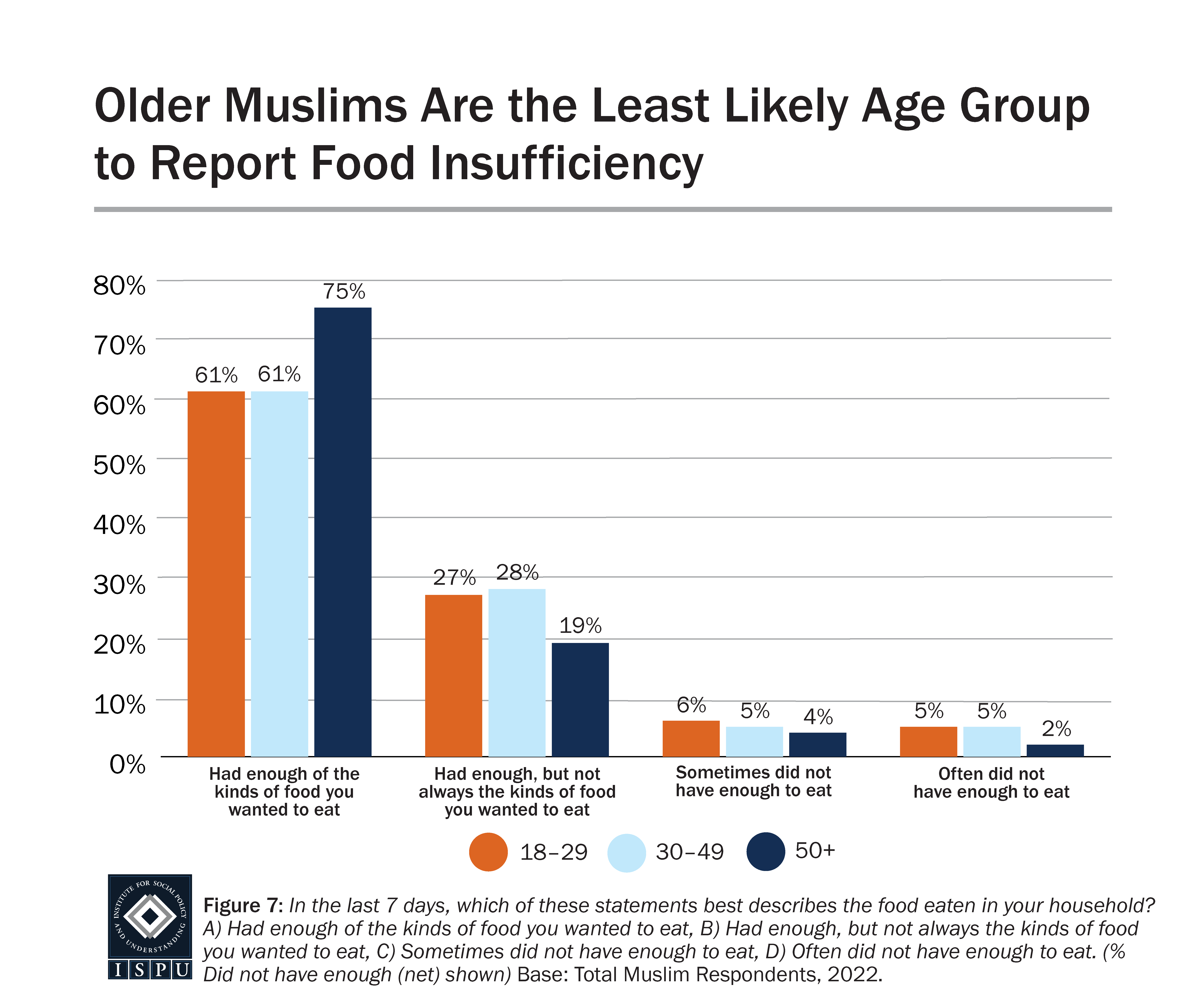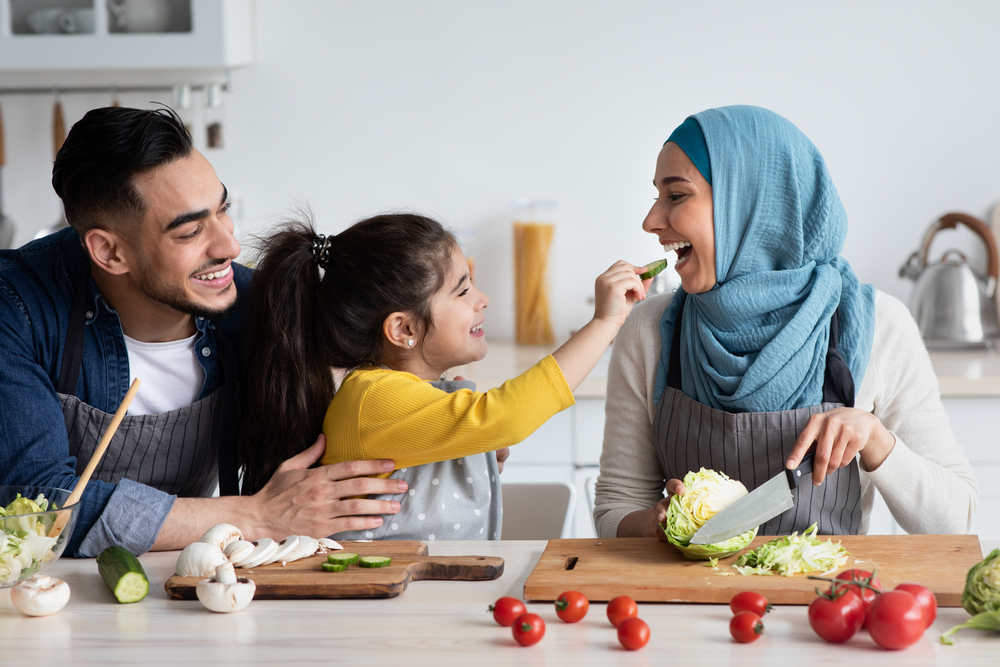
The Majority of Muslims in the U.S. Either Prefer or Require Keeping a Halal Diet: An Analysis for Decision Makers
OCTOBER 18, 2023 | BY DALIA MOGAHED
Key Takeaways:
-
- The vast majority of Muslims of all walks of life require or prefer eating halal, which refers to religiously prescribed dietary guidelines.
- Halal and kosher dietary guidelines share some similarities, but are distinct in significant ways. Observing one does not meet the requirements for the other.
- Widespread halal preferences present an opportunity for new products and services and a need for more culturally cognizant social services.
- Halal dietary needs must be considered in all contexts where people are given food, including but not limited to educational settings, health care institutions, food assistance programs, disaster relief, prisons, and elder care programs.
Summary and Recommendations
Decision makers charged with food programs in any U.S. institution, from education to incarceration, must consider the needs of all those they serve, including religious minorities who observe special dietary laws. These include millions of Muslims and Jews whose dietary requirements, halal and kosher guidelines respectively, are more than health preferences– they are a matter of sincerely held religious beliefs.
Halal (which means “permissible” in Arabic and is most often used when referring to food or consumable goods) preferences also offer a significant opportunity for business leaders looking to expand their market share. U.S. Muslims are a growing community, projected to be the second largest faith community in the country by 2040, the vast majority of whom care about observing halal guidelines in their purchase choices.
The vast majority (83%) of Muslims say they either only purchase products that are halal-certified (37%) or prefer these products but will purchase those not certified as long as they are not clearly religiously forbidden (46%). This compares to 35% of Jews who keep kosher in some form.
Muslims are also disproportionately more likely than other faith groups to suffer from food insufficiency (10%), on par with Black and Latino communities in the general public. This punctuates the need for halal options in food assistance programs.
At the same time, those Muslims who are food secure are even more likely than those who are not to require halal certification (42% vs 30%), underscoring the opportunity for businesses to offer halal products to a growing number of Muslim consumers.
Considering the needs of young adult and older Muslims is also vitally important. Within the Muslim community, students (ages 18 and older) are as likely as nonstudents to be food insufficient, but are even more likely (51% vs. 35%) to require halal certification. This suggests that food assistance programs must be visible on university campuses, and offer halal certified options. It also means that campus cafeterias should consider providing halal-certified choices to meet the needs of their student body.
Food assistance programs for seniors serve the needs of millions of Americans. However, without a halal option they may be excluding hundreds of thousands of Americans. While older Muslims (ages 50+) are less likely than younger Muslims to only purchase halal, with 28% reporting this view compared to 43% among 30-49 year olds, most older Muslims still either require (28%) halal certification or prefer it (47%), with just a quarter (24%) saying they do not keep halal.
While kosher and halal dietary lifestyles share some things in common, it is incorrect to conflate them or assume that kosher will suffice for those who observe halal, as there are also important distinctions, outlined in more detail below. Instead, the unique needs of each community must be understood and addressed.

The Majority of Muslims in the U.S. Either Prefer or Require Keeping a Halal Diet: An Analysis for Decision Makers
OCTOBER 18, 2023 | BY DALIA MOGAHED
Key Takeaways:
-
- The vast majority of Muslims of all walks of life require or prefer eating halal, which refers to religiously prescribed dietary guidelines.
- Halal and kosher dietary guidelines share some similarities, but are distinct in significant ways. Observing one does not meet the requirements for the other.
- Widespread halal preferences present an opportunity for new products and services and a need for more culturally cognizant social services.
- Halal dietary needs must be considered in all contexts where people are given food, including but not limited to educational settings, health care institutions, food assistance programs, disaster relief, prisons, and elder care programs.
Summary and Recommendations
Decision makers charged with food programs in any U.S. institution, from education to incarceration, must consider the needs of all those they serve, including religious minorities who observe special dietary laws. These include millions of Muslims and Jews whose dietary requirements, halal and kosher guidelines respectively, are more than health preferences– they are a matter of sincerely held religious beliefs.
Halal (which means “permissible” in Arabic and is most often used when referring to food or consumable goods) preferences also offer a significant opportunity for business leaders looking to expand their market share. U.S. Muslims are a growing community, projected to be the second largest faith community in the country by 2040, the vast majority of whom care about observing halal guidelines in their purchase choices.
The vast majority (83%) of Muslims say they either only purchase products that are halal-certified (37%) or prefer these products but will purchase those not certified as long as they are not clearly religiously forbidden (46%). This compares to 35% of Jews who keep kosher in some form.
Muslims are also disproportionately more likely than other faith groups to suffer from food insufficiency (10%), on par with Black and Latino communities in the general public. This punctuates the need for halal options in food assistance programs.
At the same time, those Muslims who are food secure are even more likely than those who are not to require halal certification (42% vs 30%), underscoring the opportunity for businesses to offer halal products to a growing number of Muslim consumers.
Considering the needs of young adult and older Muslims is also vitally important. Within the Muslim community, students (ages 18 and older) are as likely as nonstudents to be food insufficient, but are even more likely (51% vs. 35%) to require halal certification. This suggests that food assistance programs must be visible on university campuses, and offer halal certified options. It also means that campus cafeterias should consider providing halal-certified choices to meet the needs of their student body.
Food assistance programs for seniors serve the needs of millions of Americans. However, without a halal option they may be excluding hundreds of thousands of Americans. While older Muslims (ages 50+) are less likely than younger Muslims to only purchase halal, with 28% reporting this view compared to 43% among 30-49 year olds, most older Muslims still either require (28%) halal certification or prefer it (47%), with just a quarter (24%) saying they do not keep halal.
While kosher and halal dietary lifestyles share some things in common, it is incorrect to conflate them or assume that kosher will suffice for those who observe halal, as there are also important distinctions, outlined in more detail below. Instead, the unique needs of each community must be understood and addressed.
Introduction
Many religious traditions include dietary laws that govern how their adherents make nutritional choices, including halal and kosher laws among Muslims and Jews, respectively. It is critical that organizations that feed diverse Americans–from hunger prevention organizations to prison, schools, and hospital cafeterias–understand how widespread these dietary needs are, as well as the food insufficiency needs of each community.
These data points from the Institute for Social Policy and Understanding’s (ISPU) American Muslim Poll 2022: A Politics and Pandemic Status Report shed light on the needs and preferences of diverse groups, with a deep dive into Muslim halal preferences as well as food insufficiency among the same group. Research methodology can be found here.
This in depth analysis¹ of the needs and challenges of the Muslim community particularly in regards to their religious dietary needs is produced in partnership with the Islamic Food and Nutrition Council of America (IFANCA).
What is Halal? (Source: IFANCA)
Halal is an Arabic word meaning lawful or permitted. The opposite of halal is haram, which means unlawful or prohibited. Halal and haram are universal terms that apply to all facets of life, but this discussion will be limited to food products, meat products, cosmetics, personal care products, pharmaceuticals, food ingredients, and food contact materials. While many things are clearly halal or haram, there are some things which are not clear. Further information is needed to categorize them as halal or haram. Such items are often referred to as mashbooh, which means doubtful or questionable. All foods are considered halal except the following sources:
- Swine/pork and its by-products
- Animals NOT properly slaughtered according to Islamic method² or dead before slaughtering
- Alcoholic drinks and intoxicants
- Carnivorous animals and birds of prey
- Blood and blood by-products
- Foods contaminated with any materials from above categories
Foods containing ingredients such as gelatin, enzymes, emulsifiers, and certain flavors are questionable (mashbooh), because the origin of these ingredients or components thereof, may be haram. Meat and poultry should be processed according to Islamic requirements. This is commonly referred to as zabiha or dhabiha. Zabiha/dhabiha refers to the slaughtering of an animal or bird by a Muslim according to Islamic requirements. In the USA and Canada, halal meat must also meet all federal and/or state meat inspection laws before it can be sold.
What is the Difference Between Halal and Kosher?
Halal and kosher both refer to dietary laws according to Islamic and Jewish law respectively. There are some overlaps between the guidelines in each legal system, and also some differences.
Similarities:
-
- Pork meat is prohibited in both dietary systems.
Differences:
-
- Islam prohibits all intoxicants, including alcohols, liquors, and wines, whereas Judaism regards alcohol and wines as kosher. Hence kosher foods may contain alcohol. If they do, they are considered haram in Islam.³
- According to kosher guidelines, any pairing of meat and dairy products is strictly prohibited. This also means all utensils and equipment used to prepare meat and dairy must always be kept separate.⁴ These restrictions do not apply to halal dietary rules.
There are other differences between the two sets of dietary guidelines that are beyond the scope of this analysis. It is however important for decision makers to avoid conflating the two distinct dietary guidelines and seek to cater to each community according to its own needs.
According to the USDA “Food insufficiency means households sometimes or often did not have enough to eat. In the Household Pulse Survey (HPS), food insufficiency is measured in the last seven days.”
ACKNOWLEDGEMENTS
This research was conducted by the Institute for Social Policy and Understanding (ISPU) with generous support and partnership from IFANCA.
These data were gathered as part of ISPU’s American Muslim Poll 2022: A Politics and Pandemic Status Report. For more information about the study and full results, please visit our American Muslim Poll landing page.

Analysis
Halal Dietary Guidelines Matter to Most Muslims
The majority of Muslims (83%) in the U.S. either prefer or require keeping a halal diet. This compares to roughly a third (35%) of U.S. Jews who say the same about keeping kosher. This breaks down to 37% of Muslims reporting that for all products that require halal certification, they only purchase halal-certified products, and 46% who say they mostly prefer halal-certified food, but do purchase some foods without certification if they are not blatantly haram. US Jews are roughly equally likely (18%) to require kosher certification as to prefer it (17%).
Food Insufficiency Higher Among Muslims
One in ten Muslims report they either “sometimes” or “often did not have enough to eat” in the last seven days. This surpasses Jews (1%), Catholics (2%), Protestants (4%) and the general public (5%). It is on par with Black (8%) and Hispanic Americans (10%) in the general public, as well as non-affiliated Americans (9%).
Decision makers charged with food programs in any U.S. institution, from education to incarceration, must consider the needs of all those they serve, including religious minorities who observe special dietary laws. These include millions of Muslims and Jews whose dietary requirements are more than health preferences–they are a matter of sincerely held religious beliefs.
Halal preferences also offer a significant opportunity for business leaders looking to expand their market share. Muslims are a growing community, projected to be the second largest faith community in the country by 2040, the vast majority of whom care about observing halal guidelines in their purchase choices. The rest of this analysis will focus on Muslim dietary choices.
Majority of Food Insufficient Muslims Require or Prefer Halal
Despite the higher cost and comparative difficulty finding halal food, Muslims who report being food insufficient were as likely as those who had enough food always or most of the time to say they do not keep halal (19% vs. 17% vs.12%, respectively). Additionally, Muslims who are food insufficient are as likely as those who have enough food all of the time to require (37% vs. 42%) or prefer (44% vs. 40%) halal certified food. This underscores the need for halal options in food assistance programs. At the same time, the majority of those Muslims who are food secure require or prefer halal certification (82% of Muslims who had enough food and 88% of Muslims who had enough food, but not always the kinds they wanted), underscoring the opportunity for businesses to offer halal products to a growing number of Muslim consumers.
As expected, food insufficiency and lower income were correlated, with lower income households more likely to be food insufficient. This pattern holds in the general population and in Muslim subgroups.
Muslim Students as Likely to be Food Insufficient, More Likely to Require Halal, Compared to Nonstudents
Muslims are more likely than any other faith group to be students (13% of Muslims vs 5% of the general public). While some may assume that being a college student implies some level of affluence, our research shows Muslim students (7%) are as likely as non-students in their faith community to be food insufficient (10%).
Where Muslim students stand apart from nonstudents, however, is in their preference for a halal dietary lifestyle. Roughly half of Muslim students (51%) compared to 35% of nonstudents say that for all products that require halal certification, they only purchase halal-certified products. Another 41% of students and 47% of nonstudents report that they mostly prefer halal-certified food, but do purchase some foods without certification if they are not blatantly haram. Just 3% of Muslim students, compared to 18% of nonstudents, say they don’t keep halal at all. This suggests that food assistance programs must be visible on university campuses, and offer halal-certified options, as should university cafeterias.
Majority of Older Muslims Prefer or Require Halal
Food assistance programs for seniors serve the needs of millions of Americans. However, without a halal option they may be excluding hundreds of thousands. While older Muslims (50+) are less likely than younger Muslims to only purchase halal, with 28% reporting this view compared to 43% among 30-49 year olds, most older Muslims still either require (28%) halal certification or prefer it (47%), with just a quarter (24%) saying they do not keep halal.
Younger (18-29 years old) and middle aged (30-49 years old) Muslims are less likely than their elders (50+) to report having enough food they preferred in the past week. While 61% of both younger and middle aged Muslims said they had enough food they liked in the past week, 75% of older Muslims said the same.
Halal preferences are part of a holistic faith-based way of life, reflecting Americans’ sincerely held religious beliefs, and not simply a lifestyle or health preference. And the majority of the millions of U.S. Muslims prefer or require halal-certified products. This presents both a need and an opportunity for decision makers in the social and business sector to provide halal-certified products and services to a growing community of consumers.
1 A special thanks to the Met Council, who supported the addition of these questions to the survey.
2 https://www.ncbi.nlm.nih.gov/pmc/articles/PMC5332932/ Islamic requirements for slaughter include the following:
-
- Animals should have a preslaughter rest, and be well fed and well looked after at the point of slaughter.
- The animals must be alive or deemed to be alive at the time of slaughter.
- Slaughter must be performed by a Muslim (who is of sound mind, mature, and fully understands the Islamic procedure and conditions for slaughtering of animals).
- Animals that are slaughtered should be securely restrained, particularly the head and neck, before cutting the throat.
- Operator competence is of great importance in order to carry out satisfactory halāl slaughter.
- Tools and other implements used must be for the slaughter of halāl animals only.
- The knife must be razor sharp and without blemishes and damage. For animals with normal necks, the act of slaughter must begin with an incision on the animal’s neck just before the glottis, and for animals with long necks such as chicken, turkeys, ostriches, camels, etc., the incision must be before the glottis.
- The animal’s trachea and esophagus must be severed. The spinal cord should not be cut and the head not severed completely so as to induce immediate and massive hemorrhage. In certain mazhab (school of thought), uttering the phrase “bismillah” immediately before the slaughter is compulsory. In others, such utterance is highly encouraged.
- Must be done once only. The slaughtering implement must not be lifted off the animal during slaughtering. Any lifting is construed as one act of slaughter. Multiple acts of slaughter on one animal are prohibited.
- Slaughter the animal in such a way that its life departs quickly, and it is not left to suffer.
- Must be spontaneous and complete.
- Should not be shackled and hoisted before bleeding.
- Should be done only after the animal has lost consciousness. Restraining equipment should be comfortable for the animal.
- Further preparation and dressing of the carcass must be delayed until all signs of life and cerebral reflex have disappeared
4 https://www.healthline.com/nutrition/what-is-kosher#restrictions

Dalia Mogahed is the Director of Research at the Institute for Social Policy and Understanding, where she leads the organization’s pioneering research and thought leadership programs on American Muslims. Learn more about Dalia→



